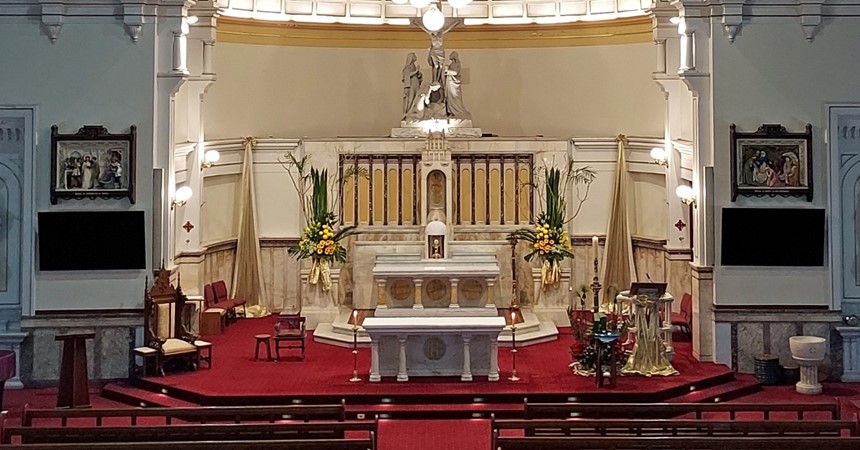It was wonderful to have the numbers return, with an increase after our COVID years of reduced liturgies and liturgical participation. Those who gathered responded loudly and with confidence to the prayers and the singing. There was a real sense of joy and contentment within each of the services. No one appeared to be in a hurry to leave.
I was surprised by the words that seem to be repeated often were:
The stone which the builders rejected,
becomes the cornerstone chosen,
Praise the work of God for this marvel in our eyes.
Jesus Christ is our foundation, our cornerstone, the measuring guide, and the promise of God to His creation. He is the light that guides us to a straight path whenever we are in darkness. He is the foundation that makes our faith even stronger and will make the Church stronger.
With so many readings, psalms, prayers and hymns over the past week, the connection between the Hebrew Scriptures and the life and words of Jesus was ever more present. On Wednesday 5 April, I read the following words in the Reflections on Learning to Listen to God, put out by Evangelisation Brisbane and written by Shane Dwyer:
“The Lord God has given me the tongue of a teacher, that I may know how to sustain the weary with a word. Morning by morning he wakens—wakens my ear to listen as those who are taught. The Lord God has opened my ear…” [Isaiah 50:4-5]
The Mass readings for this day are dark. Isaiah writes of the suffering of the just one, who does not flinch as he is hit and spat upon, while Matthew sets the scene for applying Isaiah’s text to Jesus.
As a prophet of God, Isaiah has the curious ability to reflect upon what he has seen and heard (that is, his own experience) and to apply that to a universal reality. We can assume that Isaiah himself was treated in this way and, if not writing of himself, he has seen the way in which the just are made to suffer by those who will not listen. It is unlikely that Isaiah has Jesus in mind as he writes, but the Holy Spirit who inspired him does.
As significant as the rejection and suffering of Jesus are throughout this week, we do not dwell on it here. It will reassert itself again and again as the week progresses. Instead, we have chosen to highlight the often-overlooked beginning of today’s first reading. It speaks of the one who has learned to pay attention to God and who allows what God has taught him to inspire his consolation of others.
This is the call to be ‘prophet’ intrinsic to the Christian vocation. Each of us is to immerse ourselves in paying attention to what God is saying and doing so that we, in turn, can speak of that through every word and deed. No more is this just for the prophets of old. “With the coming of the Holy Spirit, we are all to proclaim the truth and love of God with every element of our being” (Pope Francis, Morning Meditation, December 16, 2013).
My personal reflections for the week have been around our vocational call and what it means to be a prophet in today’s context. What is God saying to us? What is God asking of us? What is God calling us to?
For me, this is the message of Easter. How are we living the resurrected Christ now? The resurrection is both an historical event and a present reality. The renewal of our baptismal promises reminds us to make real our belief in Jesus Christ.
The Chrism Mass readings from Isaiah (61:1-3, 6, 8-9) and Luke (4:16-21) about being anointed by the Spirit were again reflected in the prayer of Good Friday ‘For those in tribulation’.
We have Jesus unrolling the scroll and reading:
The spirit of the Lord has been given to me,
for he has anointed me.
He has sent me to bring the good news to the poor,
to proclaim liberty to captives
and to the blind new sight,
to set the downtrodden free,
to proclaim the Lord’s year of favour.
For those in tribulation:
Let us pray, dearly beloved,
to God the Father almighty,
that he may cleanse the world of all errors,
banish disease, drive out hunger,
unlock prisons, loosen fetters,
granting to travellers safety, to pilgrims return,
health to the sick, and salvation to the dying.
Almighty ever-living God,
comfort of mourners, strength of all who toil,
may the prayers of those who cry out in any tribulation
come before you,
that all may rejoice,
because in their hour of need
your mercy was at hand.
Through Christ our Lord.
Amen.
So may we be reflective of the servant leadership shown by Jesus when he took off his outer garment and washed the feet of his disciples. This is our call as individuals and as a community of believers, the church.
This is about each of us. No matter how limited in the grand scheme of things our leadership might be, each of us exercises leadership as an intrinsic part of our baptismal vocation. In the same way as we can come before God in prayer (we are ‘priests’), and we are to proclaim God’s presence and truth with our lives (we are ‘prophets’), we are also to provide the leadership within the Church and the world that shows by word and deed how each of us is called to live and love (we are ‘kings’). See the Catechism of the Catholic Church # 1241.
Easter blessings to you and yours.
Follow mnnews.today on Facebook.

